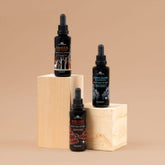
Lion's Mane Research on Medicinal Use

Lion’s Mane - A Super-functional Medicinal Mushroom
Lion’s Mane (Hericium erinaceum) is an incredible mushroom which is as delicious as it is medicinal. It has traditionally been consumed as both a food and a medicine in East Asia. Now it’s finally getting recognition as a powerful functional food in the West. An absolute wealth of bioactive compounds have been identified in it including polysaccharides, erinacines, hericerins, hericenones, resorcinols, mono and diterpenes, and aroma compounds. Lion’s Mane is most commonly touted as a brain health mushroom, a sort of nootropic neuro-supercharger. While this may be true, we wanted to briefly explore what other health benefits the research suggests this mushroom may have.
Lion’s Mane and Bone Health
This 2017 study looked at 11 different compounds in Lion’s Mane. Three of the compounds had a strong cellular antioxidant effect, and four more compounds had strong anti-osteoporotic activity (1). “...results suggested that H. erinaceum could be utilized in the development of natural antioxidant and anti-osteoporotic nutraceuticals and functional foods”. So Lion’s Mane is an antioxidant - you could have guessed that - but it may actually improve bone health as well by interfering with some of the processes which cause osteoporosis (bone loss).
Lion’s Mane and Stomach Health - Treatment of Irritable Bowel Disease with Lion’s Mane Extract
This 2016 study was done on mice with upset tummies. In fact, the mice had acute intestinal inflammation and bleeding. They were given a Lion’s Mane extract which drastically improved their stomachs. It reduced the build-up of bad stuff in their colons and improved the health of their mucous membranes and stomach linings, thereby reducing the inflammation and bleeding. The Lion’s Mane also seemed to fix the production of other compounds in the mice’s stomachs which naturally reduced oxidative stress. The study ultimately concluded that Lion’s Mane extract may be used as a protective agent against irritable bowel disease (IBD) (2).
Another study in rodents showed that Lion’s Mane reduced the severity of ulcers in a significant way. Again, it protected the mucosa, an important part of the stomach, and the study declared that compounds in Lion’s Mane extract may have gastroprotective activity (3).
Lion’s Mane and Obesity
Metabolic diseases are finally becoming better understood. Many experts believe cancer is actually a metabolic disease. Diabetes is another metabolic disease, as is obesity. Obesity is the culmination of many factors. However, like many diseases, inflammation in the affected tissues is the underlying cause of obesity. In the case of obesity, the adipose tissue is actually what gets inflamed. This study from 2015 looked at the effects of Lion’s Mane extract on adipocytes, or fat cells. The study concludes, “ Our findings indicate the possibility that H. erinaceus [Lion’s Mane] exerts anti-inflammatory effects...and prevents or ameliorates adipose tissue inflammation associated with obesity” (4). So, we have to go there... Lion’s Mane extract may just help with fat loss.
Lion’s Mane and Cancer
Another 2015 study identified two new compounds in Lion’s Mane and looked at five others with regard for their anticancer activities. It found that one of the newly identified compounds called Hericerin A, along with with previously recognized heracerin, may both be useful as potential cancer treatments (5).
Another study looked at Lion’s Mane and its ability to stave off lung cancer in mice. The mushroom extract had a number of very positive effects including eliciting cancer cell death and preventing metastasis, or growth of the cancer (6).
This study found that Lion’s Mane may help fight leukemia, again by causing apoptosis (cell death) of the cancer cells. It went on to conclude that “The results indicate that H. erinaceus [Lion’s Mane] mushrooms may have therapeutic potential against human leukemia” (7).
Lion’s Mane and Neuro Benefits
Lion’s Mane is an oft-purported nootropic - that’s arguably its main claim to fame since being introduced to the West as a dietary supplement. Since the brain is such a complex, dynamic organ, there are countless ways a nootropic could improve it. Therefore the term nootropic is actually quite vague. One way Lion’s Mane does appear to improve the brain is through neurogenesis. Compounds like hericenones and erinacines in Lion’s Mane appear to stimulate Nerve Growth Factor (NGF) which can promote the growth of nerve cells. One study found this to be the case, as it identified NGF synthesis in cells as a result of administering Lion’s Mane extract. While the mushroom showed nerve growth effects, it failed to yield neuroprotective benefits in cells exposed to oxidative stress. Still, the neurotrophic (growth) properties produced in the study are positive.

Clearly lions mane does some incredible things. Another study wrote “The reported health-promoting properties of the mushroom fruit bodies, mycelia, and bioactive pure compounds include antibiotic, anticarcinogenic, antidiabetic, antifatigue, antihypertensive, antihyperlipodemic, antisenescence, cardioprotective, hepatoprotective, nephroprotective, and neuroprotective properties and improvement of anxiety, cognitive function, and depression. The described anti-inflammatory, antioxidative, and immunostimulating properties in cells, animals, and humans seem to be responsible for the multiple health-promoting properties.” (8). There is no more thorough way we could have elucidated the breadth of possible health benefits of Lion’s Mane mushroom.
All the studies referenced here used different amount of Lion’s Mane, different extracts, in different situations, with countless different variables that may or may not replicate the same way when you or I take our medicinal mushroom supplement in the morning. But the fact that it has shown to do all these things means that the effects could occur on a meta scale even with a lower dose. We believe a lot of the health benefits highlighted in the studies are tangible, and that Lion’s Mane mushroom is one of the most incredible functional foods in the world.
1. Li W, Lee SH, Jang HD, Ma JY, Kim YH. Antioxidant and Anti-Osteoporotic Activities of Aromatic Compounds and Sterols from Hericium erinaceum. Molecules. 2017;22(1):108. Published 2017 Jan 11. doi:10.3390/molecules22010108
2. Qin M, Geng Y, et. al. Anti-Inflammatory Effects of Ethanol Extract of Lion’s Mane Medicinal Mushroom, Hericium erinaceus (Agaricomycetes), in Mice with Ulcerative Colitis. International Journal of Medicinal Mushrooms. Volume 18, 2016 Issue 3, pages 227-234. DOI: 10.1615/IntJMedMushrooms.v18.i3.50
3.Wong JY, Abdulla MA, Raman J, et al. Gastroprotective Effects of Lion's Mane Mushroom Hericium erinaceus (Bull.:Fr.) Pers. (Aphyllophoromycetideae) Extract against Ethanol-Induced Ulcer in Rats. Evid Based Complement Alternat Med. 2013;2013:492976. doi:10.1155/2013/492976
4. Mori K, Ouchi K, et. al. The Anti-Inflammatory Effects of Lion's Mane Culinary-Medicinal Mushroom, Hericium erinaceus (Higher Basidiomycetes) in a Coculture System of 3T3-L1 Adipocytes and RAW264 Macrophages. International Journal of Medicinal Mushrooms. Volume 17, 2015 Issue 7, pages 609-618. DOI: 10.1615/IntJMedMushrooms.v17.i7.10
5. Wei Li, Wei Zhou, Eun-Ji Kim, Sang Hee Shim, Hee Kyoung Kang, Young Ho Kim, Isolation and identification of aromatic compounds in Lion’s Mane Mushroom and their anticancer activities, Food Chemistry, Volume 170, 2015, Pages 336-342, ISSN 0308-8146, https://doi.org/10.1016/j.foodchem.2014.08.078.
6. Sung Phil Kim, Seok Hyun Nam, and Mendel Friedman, Hericium erinaceus (Lion’s Mane) Mushroom Extracts Inhibit Metastasis of Cancer Cells to the Lung in CT-26 Colon Cancer-Tansplanted Mice. Journal of Agricultural and Food Chemistry 2013 61 (20), 4898-4904, DOI: 10.1021/jf400916c.
7. Kim, Sung Phil and Kang, Mi Young and Choi, Yong Hee and Kim, Jae Ho and Nam, Seok Hyun and Friedman, Mendel, Mechanism of Hericium erinaceus (Yamabushitake) mushroom-induced apoptosis of U937 human monocytic leukemia cells. Food Funct. Volume 2, 2011 Issue 6, Pages 348-356. DOI: 10.1039/C1FO10030K
8. Friedman M, Chemistry, Nutrition, and Health-Promoting Properties of Hericium erinaceus (Lion’s Mane) Mushroom Fruiting Bodies and Mycelia and Their Bioactive Compounds. J. Agric. Food Chem. 2015, 63, 32, 7108-7123. https://doi.org/10.1021/acs.jafc.5b02914.


